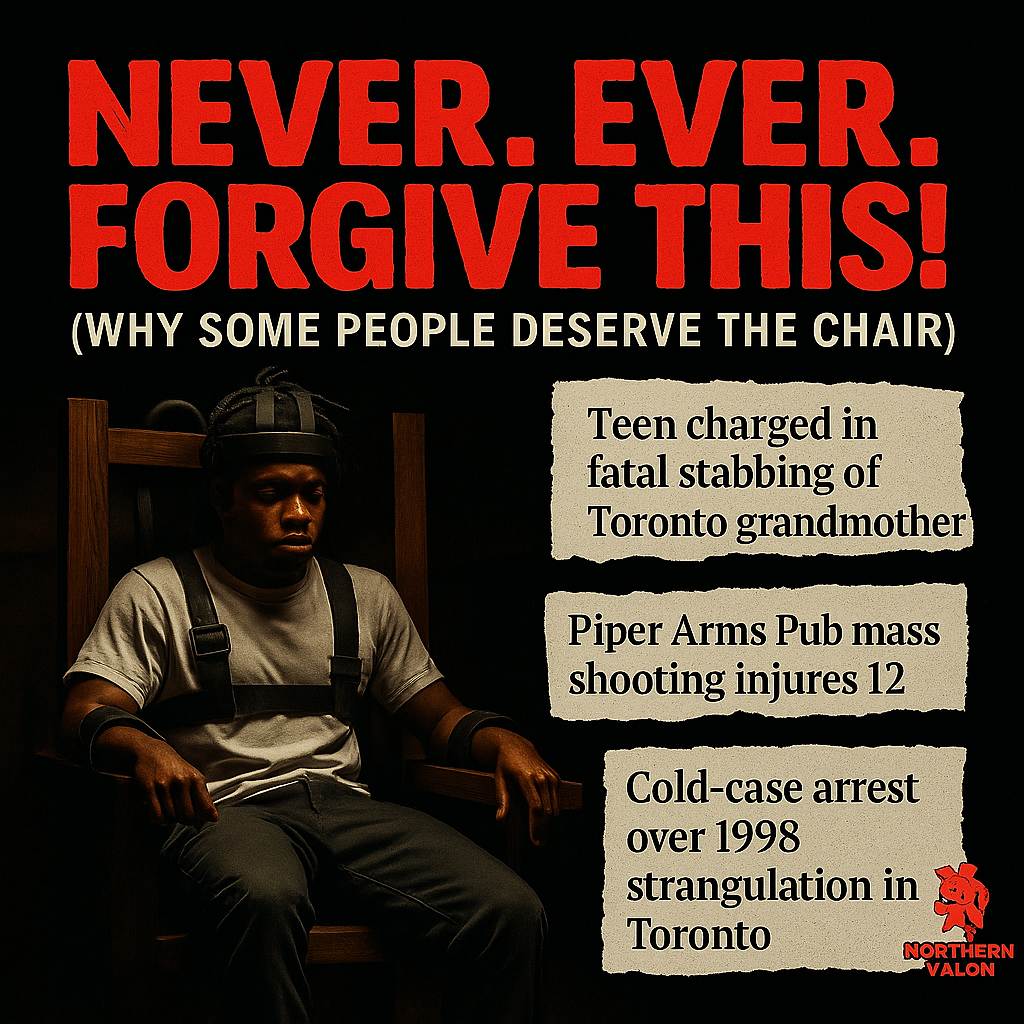
1 Canadian Mans Case for Capital Punishment: Why Justice Sometimes Demands the Ultimate Price
Share
WARNING: This Article Isn’t for the Timid
We’re diving deep into the raw, unpopular truth not the sanitized headlines or social media platitudes. If you think every criminal deserves a second chance no matter how monstrous the crime, this isn’t the article for you.
But if you believe some acts are so evil they demand ultimate accountability, read on.
The Problem No One Wants to Talk About
Let’s cut through the noise.
In Canada and much of the Western world, we treat even the worst criminals like victims of circumstance. Rapists, mass shooters, child murderers — we warehouse them in prison with taxpayer-funded meals, therapy, and “reintegration programs.”
Ask yourself:
Is that justice… or cowardice?
FACT: Canada has zero capital punishment. The worst a serial killer faces here is “life” in prison — which often means parole in 25 years. That’s right. You can rape and kill multiple children, and be free before retirement age.
Let that sink in.
The Myth of Redemption for Monsters
Here’s the hard truth the media won’t say:
Some people cannot be rehabilitated.
Some crimes are so vile, so premeditated, so inhuman, that the only appropriate response is permanent removal — not because of revenge, but because of moral justice.
The man who rapes and kills his own daughter?
The terrorist who executes civilians on livestream?
The repeat predator who laughs in court, knowing he’ll get three meals a day?
These people don’t need “programs.”
They need removal from this earth.
⚖️ Capital Punishment Is Not About Revenge It’s About Moral Boundaries
Critics love to ask:
“But who are we to decide who lives and who dies?”
The answer?
A civilized society must draw lines.
Capital punishment isn’t about vengeance. It’s about defending the moral fabric of a nation. When we say “life is sacred,” it must mean that taking an innocent life has a price.
And if that price isn’t death for the killer… then what does “sacred” even mean anymore?
The Inconvenient Statistics
Let’s look at what’s really happening in countries without capital punishment:
Repeat violent offenders get released — and kill again.
Victims’ families get life sentences of grief, while the murderer gets visitation rights and fan mail.
The cost of keeping one inmate for life? Over $2 million in Canada.
Meanwhile, justice is delayed, diluted, and disrespected.
Compare this to countries like Japan or Singapore, where execution is still used in extreme cases. The violent crime rate? Dramatically lower.
The “Innocent Man” Argument — A Strawman?
Critics will say: “What if we execute an innocent person?”
Yes — that possibility exists. That’s why capital punishment should only be used in cases with irrefutable evidence: DNA, video footage, confession, or overwhelming forensic data.
If a killer livestreams their attack, brags about it, and leaves a digital trail of planning — they don’t need a trial that drags for 15 years.
They need one thing: finality.
Canada: Time to Man Up?
We pretend we’re “more humane” by avoiding the death penalty. But in reality?
We’ve become a nation afraid of consequences.
We coddle criminals and abandon victims.
Capital punishment doesn’t make us barbaric.
It makes us serious.
Serious about justice.
Serious about deterrence.
Serious about drawing the line between evil and everything else.
Conclusion: Mercy Has Limits
A society that refuses to punish evil loses the right to call itself civilized.
If we won’t defend the innocent, the next blood is on our hands.
Bring back the death penalty — not for everyone, but for the worst of the worst.
Because some people don’t need “second chances.”
They need a swift, final judgment.
